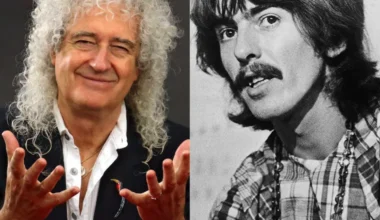The Rolling Stones and Led Zeppelin stand as two of the biggest names in British rock history, yet the relationship between the two bands has not always been smooth. Despite sharing roots in the 1960s rock scene, Rolling Stones guitarist Keith Richards has consistently voiced sharp critiques of Led Zeppelin, particularly over the years. Yet, despite his misgivings about the band, Richards has nothing but admiration for their guitarist, Jimmy Page.
In 1974, The Rolling Stones unexpectedly unveiled a previously unreleased collaboration with Page called “Scarlet.” The track captured the gritty essence of the Stones’ era-defining sound blended with Page’s intricate guitar work. Fans were thrilled, but Richards’ admiration for Page was tempered with longstanding, sharp-edged remarks about Led Zeppelin’s other members.
For decades, Richards has expressed disdain for the band’s style, noting that while Page’s talent is undeniable, the rest of Led Zeppelin left him cold. In one of his earliest criticisms, dating back to 1969, he took issue with Robert Plant’s vocal style, saying, “The guy’s voice started to get on my nerves. Maybe he’s a little too acrobatic.” Even as the years passed, his opinion of Plant’s voice did not improve.
Despite Richards’ pointed critiques, his admiration for Page has remained strong. Speaking about Led Zeppelin’s legacy, he once said, “To me, Led Zeppelin is Jimmy Page if you wanna cut the story short.” In other words, while Richards respected Page’s musical prowess, he felt the rest of Led Zeppelin’s sound was lacking.
Richards’ harsh critiques stem from a deeper contrast in personalities and musical approach. He saw Zeppelin as overly serious and grandiose compared to the Stones’ loose, rebellious energy. Richards viewed Plant as “exuberant” in a theatrical sense, placing him in the same category as vocalists like Roger Daltrey, Rod Stewart, and even Mick Jagger—performers who, in his view, embodied a “larger-than-life” frontman persona that Richards found tiresome.
Richards also commented on John Bonham’s drumming style, describing him as a “hell of a powerhouse drummer,” but felt he was “heavy-handed.” He once quipped that Bonham’s playing was “like an uncontrolled 18-wheeler thundering down the highway.” In his assessment, Zeppelin’s sound was overly bombastic, a feeling he summed up by calling it “a little hollow.”
Although Richards has been vocal in the press about his distaste for Led Zeppelin’s style, it hasn’t affected his friendship with Page. Page, in turn, has been diplomatic about Richards’ critiques, acknowledging his respect for the Stones guitarist. “Keith can say what he wants,” Page said in an interview with Classic Rock. “I think he’s done some amazing work. I respect his playing…I’m not sure what he means by calling Led Zeppelin hollow. I think he’s got his tongue in his cheek. What we did was really cool.”
Despite their differences, both Richards and Page remain emblematic of their respective eras, with each embracing a unique approach to rock. The Stones, known for their raw, blues-driven performances, have shared stages with legends like Bob Dylan and Amy Winehouse. However, they have notably never shared a stage with Led Zeppelin—a testament to the complex dynamic between the two bands.
The closest the world came to seeing Richards and Page perform together was during the 1992 Rock and Roll Hall of Fame induction ceremony, where Richards joined Page along with John Fogerty and Carlos Santana. The performance, though energetic, was marked by an undercurrent of tension—likely a result of Richards’ longstanding remarks on Zeppelin.
Richards’ unfiltered honesty, for which he’s both revered and criticized, has often led him to speak bluntly about Led Zeppelin. While his remarks may seem scathing, he has always emphasized that his critiques were purely musical rather than personal.







